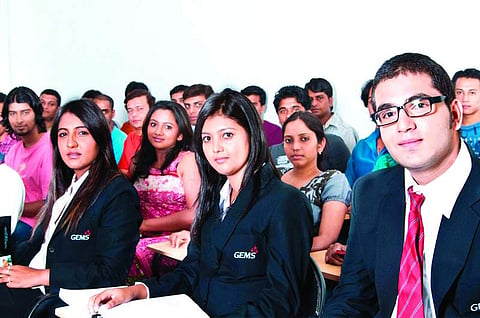

Do we really need to think of an MBA right after graduation? What about placements? Every student is confused about these things. So we decided to ask someone who is an expert in this field. We catch up with Kunal Nehruji, Executive Director of GEMS B School. Excerpts:
A unique feature about GEMS is that MBA students attend classes on Saturdays and Sundays and work on the other days. Could you tell us more about this?
We’re one among the few in the country to have this unique feature. Today, if someone thinks of a work-study programme, GEMS is the first option. This isn’t just a model where the student gets to work and hence earns a salary. There is a lot of intellect that goes into it. We make sure that the fresh graduates who join GEMS get placed during their first week at college itself. From Monday to Friday, they work for five days a week. Two years later, they get an MBA with two years of work experience.
The student gets a job related to their field of specialisation. So they learn it theoretically for two days and practically for five days. Because of this, they get to apply what they’ve learnt and learn it better. Vice versa, they get to grasp the subjects much easier. Also the student gets to earn more than what they’ve invested.
Since they won’t be attending many classes, will they miss out on the portions?
While a normal student takes, say, five hours to learn a management concept, my students take about two hours since they get to practically apply their knowledge in the real world. With my students, you get to save time spent on teaching a normal student to visualise a management concept.
Aren’t the students fully packed? Don’t they deserve a break?
There is a very small percentage that finds it difficult to cope up. Even before they join the programme they know what they’re signing up for. But when compared to a conventional programme, we have students who say that they can’t cope up.
You’ve recently introduced British MBAs? Why this step when people are going bonkers about US MBAs?
The trend is slowly changing and going to the US is not that easy now. But we were looking for an international collaboration. We wanted a course where our students could study a part of the programme in India and a part abroad. We interacted with a few US and UK universities. We wanted a university that is in line with our objective. The University of Sunderland was very convenient. They too run a programme similar to ours. The thoughts, ideas and objectives matched and we went ahead with them. Our students will be studying in their London campus, where job opportunities are much better.
What will be the future of MBAs in India?
After a specific point, an MBA becomes inevitable. This is a good add-on with your technical qualification. Technical skills saturate after a particular time. There is no growth. At this time, an MBA comes in handy. It helps you jump to management. You get to handle projects and manage people and teams.
